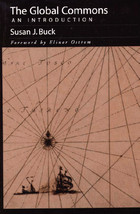
Vast areas of valuable resources unfettered by legal rights have, for centuries, been the central target of human exploitation and appropriation. The global commons -- Antarctica, the high seas and deep seabed minerals, the atmosphere, and space -- have remained exceptions only because access has been difficult or impossible, and the technology for successful extraction has been lacking. Now, technology has caught up with desire, and management regimes are needed to guide human use of these important resource domains.
In The Global Commons, Susan Buck considers the history of human interactions with each of the global commons areas and provides a concise yet thorough account of the evolution of management regimes for each area. She explains historical underpinnings of international law, examines the stakeholders involved, and discusses current policy and problems associated with it.
Buck applies key analytical concepts drawn from institutional analysis and regime theory to examine how legal and political concerns have affected the evolution of management regimes for the global commons. She presents in-depth case studies of each of the four regimes, outlining the historical evolution of the commons -- development of interest in exploiting the resource domain; conflicts among nations over the use of the commons; and efforts to design institutions to control access to the domains and to regulate their use -- and concluding with a description of the management regime that eventually emerged from the informal and formal negotiations.
The Global Commons provides a clear, useful introduction to the subject that will be of interest to general readers as well as to students in international relations and international environmental law, and in environmental law and policy generally.
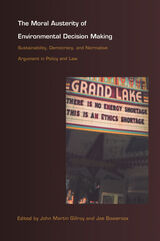
The contributors search for these assumptions and principles in short arguments and debates over the role of science, social justice, instrumental value, and intrinsic value in contemporary environmental policy. In their discussion of moral alternatives to enrich environmental decision making and in their search for a less austere and more robust role for normative discourse in practical policy making, they analyze a series of original case studies that deal with environmental sustainability and natural resources policy including pollution, land use, environmental law, globalism, and public lands. The unique structure of the book—which features the core contributors responding in a discourse format to the central chapters’ essays and debates—helps to highlight the role personal and public values play in democratic decision making generally and in the field of environmental politics specifically.
Contributors. Joe Bowersox, David Brower, Susan Buck, Celia Campbell-Mohn, John Martin Gillroy, Joel Kassiola, Jan Laitos, William Lowry, Bryan Norton, Robert Paehlke, Barry G. Rabe, Mark Sagoff, Anna K. Schwab, Bob Pepperman Taylor, Jonathan Wiener
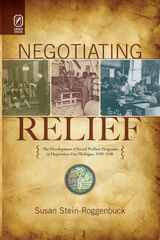
Guided by fiscal localism and a firm belief in home rule, local officials fought to retain control of relief. Stein-Roggenbuck argues that while significant changes occurred in welfare policy as a result of the New Deal, many continuities remained. Among those was the responsibility of families to provide financial support. Often forgotten were those on general relief—individuals who did not fit the federal programs such as Aid to Dependent Children (ADC) and Old Age Assistance (OAA). General relief became a third track of welfare.
Drawing on newspaper records, county and city board minutes, social welfare agency records, federal records, and case file records, Negotiating Relief gives voice to the numerous groups involved in welfare debates, particularly the recipients of relief. This book adds to our understanding of the local implementation of welfare policy in both rural and urban areas.
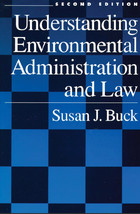
More than any other field of public administration, environmental administration is defined by its legal content. Federal legislation has a direct and immediate impact on state and federal bureaucrats, and citizen groups must constantly adjust to changing standards for environmental protection and regulation.
In Understanding Environmental Administration and Law, Susan J. Buck examines the use of environmental law by exploring the policy process through which such law is made, the political environment in which it is applied, and the statutory and case laws that are critical to working within the regulatory system. The book provides an analytic framework for the legal context of environmental administration and familiarizes readers with the development and implementation of the federal regulatory structure.
A revised and expanded edition of this book was published by Island Press in 1996.

More than any other field of public administration, environmental administration is defined by its legal content. Federal legislation has a direct and immediate impact on state and federal bureaucrats, and citizen groups must constantly adjust to changing standards for environmental protection and regulation.
In Understanding Environmental Administration and Law, Susan J. Buck examines the use of environmental law by exploring the policy process through which such law is made, the political environment in which it is applied, and the statutory and case laws that are critical to working within the regulatory system. The book provides an analytic framework for the legal context of environmental administration and familiarizes readers with the development and implementation of the federal regulatory structure.
A revised and expanded edition of this book was published by Island Press in 1996.
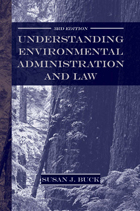
- the Bush Administration and its approach to administering environmental laws
- the continuing evolution of environmentalism and the changing role of environmental regulation in the United States
- the development and implementation of environmental agreements at the international level
- the impacts and implications of globalization
READERS
Browse our collection.
PUBLISHERS
See BiblioVault's publisher services.
STUDENT SERVICES
Files for college accessibility offices.
UChicago Accessibility Resources
home | accessibility | search | about | contact us
BiblioVault ® 2001 - 2024
The University of Chicago Press









